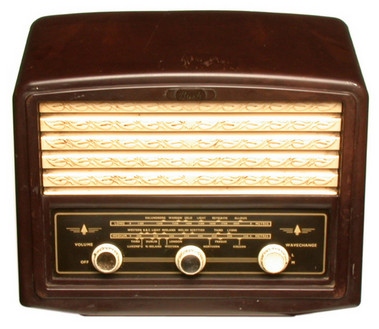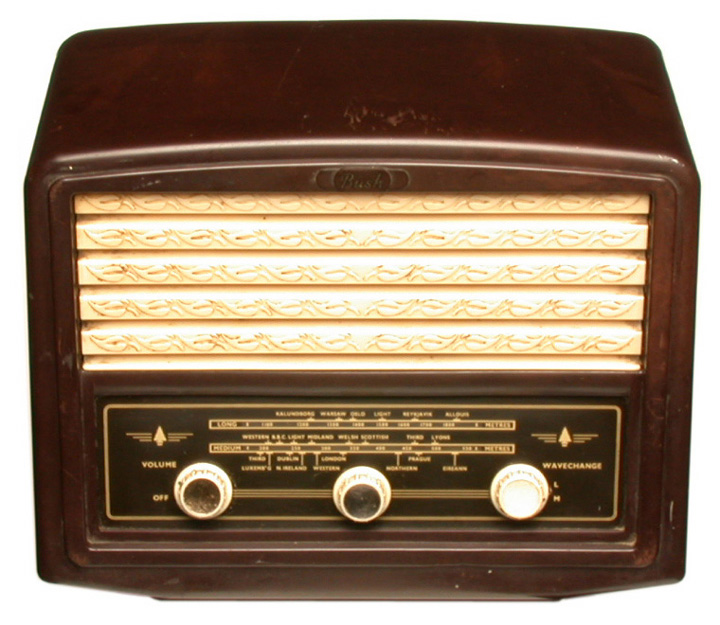Bush Radio, 1950s, Original
This radio was manufactured by Bush, a well-known radio company.
The radio is box-shaped, is portable and is made of Bakelite. One
side has been removed to display the interior components.
At the front of the radio is an indented panel containing the controls and speaker outlet. The control section forms the lower part of the panel. The first knob on the left turns the radio on, and also controls the volume. The middle knob sweeps a pointer back and forward along one of two indicator lines on the panel, and this is how the listener selects the station they want to listen to. The knob on the right changes the wavelength from long to medium.
At the top of the control panel there is a cream decorated panel, which has six slits through which sound travels towards the listener.
Inside the box is a selection of valves and turning coils. When the radio was turned on it needed time to warm up before it could transmit effectively. Early radios were powered by electricity, so had to be positioned near a socket. This confined music and information to one place in the house. Portable radios, powered by battery, were a major breakthrough, allowing the listener to move around with the radio to different rooms in the house, and also into the garden, beach or park.
At the front of the radio is an indented panel containing the controls and speaker outlet. The control section forms the lower part of the panel. The first knob on the left turns the radio on, and also controls the volume. The middle knob sweeps a pointer back and forward along one of two indicator lines on the panel, and this is how the listener selects the station they want to listen to. The knob on the right changes the wavelength from long to medium.
At the top of the control panel there is a cream decorated panel, which has six slits through which sound travels towards the listener.
Inside the box is a selection of valves and turning coils. When the radio was turned on it needed time to warm up before it could transmit effectively. Early radios were powered by electricity, so had to be positioned near a socket. This confined music and information to one place in the house. Portable radios, powered by battery, were a major breakthrough, allowing the listener to move around with the radio to different rooms in the house, and also into the garden, beach or park.

Height:24.5cm

Height:24.5cm

This radio was manufactured by Bush, a well-known radio company.
The radio is box-shaped, is portable and is made of Bakelite. One
side has been removed to display the interior components.
At the front of the radio is an indented panel containing the controls and speaker outlet. The control section forms the lower part of the panel. The first knob on the left turns the radio on, and also controls the volume. The middle knob sweeps a pointer back and forward along one of two indicator lines on the panel, and this is how the listener selects the station they want to listen to. The knob on the right changes the wavelength from long to medium.
At the top of the control panel there is a cream decorated panel, which has six slits through which sound travels towards the listener.
Inside the box is a selection of valves and turning coils. When the radio was turned on it needed time to warm up before it could transmit effectively. Early radios were powered by electricity, so had to be positioned near a socket. This confined music and information to one place in the house. Portable radios, powered by battery, were a major breakthrough, allowing the listener to move around with the radio to different rooms in the house, and also into the garden, beach or park.
At the front of the radio is an indented panel containing the controls and speaker outlet. The control section forms the lower part of the panel. The first knob on the left turns the radio on, and also controls the volume. The middle knob sweeps a pointer back and forward along one of two indicator lines on the panel, and this is how the listener selects the station they want to listen to. The knob on the right changes the wavelength from long to medium.
At the top of the control panel there is a cream decorated panel, which has six slits through which sound travels towards the listener.
Inside the box is a selection of valves and turning coils. When the radio was turned on it needed time to warm up before it could transmit effectively. Early radios were powered by electricity, so had to be positioned near a socket. This confined music and information to one place in the house. Portable radios, powered by battery, were a major breakthrough, allowing the listener to move around with the radio to different rooms in the house, and also into the garden, beach or park.
Keyboard controls:
Turn left: press left arrow key; Turn right: press right arrow key;
Zoom in: press shift key; Zoom out: press control key (ctrl);




















